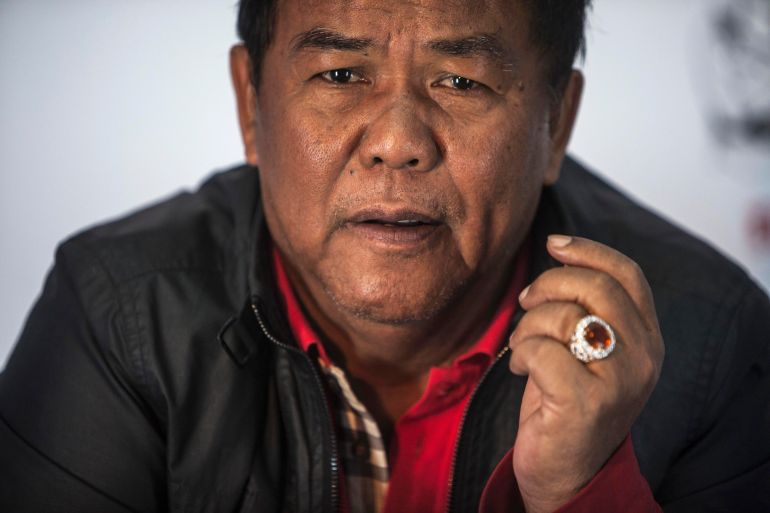Thai pro-government protest leader shot
Kwanchai Praipana was shot and wounded by unidentified assailants in a drive-by shooting.

A leader of the pro-government ‘red-shirt’ movement has been shot and wounded outside his home in northeast Thailand, hours after Prime Minister Yingluck Shinawatra enforced a state of emergency in Bangkok and its surrounding areas.
Kwanchai Praipana, who leads thousands of pro-government supporters in Udon Thani city, was shot and wounded by unidentified assailants in a drive-by shooting on Wednesday.
Speaking to Al Jazeera’s Scott Heidler, a family member said Praipana was in hospital recovering after having bullets removed from his arm and leg in what police described as a “politically motivated attack”.
The shooting comes shortly after the government introduced a state of emergency to cope with protests aimed at ousting the embattled prime minister from power.
The new measures, which cover Bangkok and its surrounding provinces, allow security agencies to impose curfews, detain suspects without charge, censor media, ban political gatherings of more than five people and declare areas off-limits.
The decree follows increasing attacks at protest sites for which the government and protesters blame each other.
Announcing the 60-day emergency late on Tuesday, ministers said they had no plans to clear the camps that protesters set up at seven major road junctions in the city.
Rather, they said they wanted to prevent an escalation of violence after deaths and injuries caused by grenade attacks on demonstrators over the weekend.
Despite the decree, most of the capital remained unaffected by the state of emergency, with a light police presence, no overnight curfew and protesters on the streets.
Political tensions
The protests are the latest episode in an eight-year political crisis that has gripped Thailand since Yingluck’s older brother, former Prime Minister Thaksin Shinawatra, was ousted by royalist generals seven years ago.
The conflict pits the middle class of Bangkok and royalist establishment against Yingluck and her brother and their support base among the rural poor in the north and northeast.
Protesters want Yingluck to step down to make way for an appointed government that would oversee electoral reforms and curb the political dominance of her family.
Protesters have threatened to disrupt the election Yingluck called for February 2. The opposition Democrat Party, closely aligned with the protesters, is boycotting the polls.
Protest leader Suthep Thaugsuban, a former deputy prime minister, has rejected the election outright. He accuses Thaksin of corruption and nepotism and wants to change the electoral system to eradicate the influence of Thaksin, who lives in exile in Dubai to avoid a jail term handed down in 2008 for abuse of power.
The Election Commission said it would seek a ruling from the Constitutional Court on Wednesday on whether it could delay the vote.
Adding to Yingluck’s problems, farmers, who are part of her core constituency, threatened to join the protest if they did not get paid for the rice they sold to the government under a controversial intervention scheme.